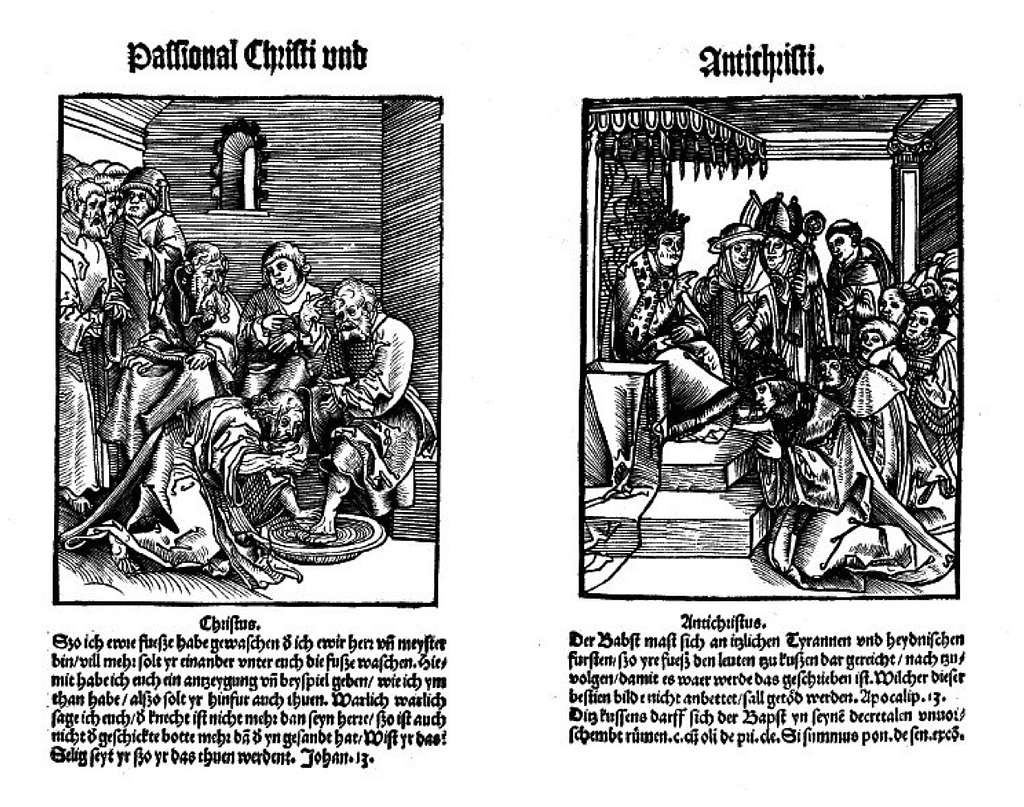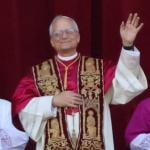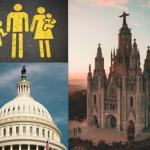In our recent discussion of the Conclave to elect the pope, we cited Melanchthon’s Treatise on “The Power and Primacy of the Pope,” the confessional document that explains why we Lutherans consider the papacy–the office, not necessarily individual holders of that office–to be antichrist. (Not in the sense of End Times prophecies, as such, but in the sense of 1 John 2:18: “now many antichrists have come.”)
Now I’d like to cite Luther on the subject in another authoritative confession, the Smalcald Articles, which were written to set forth the positions Lutherans would take in an Ecumenical Council, which was expected to be called in order to resolve the controversies of the Reformation. Instead, the Pope called the Council of Trent, which excluded Protestants and was designed solely to squelch them.
Here in Article IV “Of the Papacy,” Luther calls on the Pope to be considered as just another bishop, as he was in the early church before Pope Leo I (!) claimed authority over all Christians. (This is a translation from the German, with the bracketed material giving the additional readings from the Latin version.)
1 That the Pope is not, according to divine law or according to the Word of God the head of all Christendom (for this [name] belongs to One only, whose name is Jesus Christ), but is only the bishop and pastor of the Church at Rome, and of those who voluntarily or through a human creature (that is, a political magistrate) have attached themselves to him, to be Christians, not under him as a lord, but with him as brethren [colleagues] and comrades, as the ancient councils and the age of St. Cyprian show.
Luther goes on to catalogue the way the popes have seized power, claimed authority, and added doctrines that obscure the Gospel. He argues that the papacy meets the description of antichrist in 2 Thessalonians 2:4: “who opposes and exalts himself against every so-called god or object of worship, so that he takes his seat in the temple of God, proclaiming himself to be God.”
If the bishop of Rome were to renounce all of those claims and just be a regular bishop, might it be acceptable to make him the presiding officer of the global church, sort of like a glorified synodical president? That solution had been proposed as a way to resolve the schisms, both between Catholics and Protestants and between the Western Church and the Eastern Church, some of whose theologians agree that the papacy is the antichrist (see here and here).
Luther sounds somewhat open to the idea of letting the pope be at the top of the church organizational chart, but then says that it will never happen, would never work, and there is no need for it. From Article IV of the Smalcald Articles:
7 And supposing that the Pope would yield this point, so as not to be supreme by divine right or from God’s command, but that we must have [there must be elected] a [certain] head, to whom all the rest adhere [as their support] in order that the [concord and] unity of Christians may be preserved against sects and heretics, and that such a head were chosen by men, and that it were placed within the choice and power of men to change or remove this head, just as the Council of Constance adopted nearly this course with reference to the Popes, deposing three and electing a fourth; supposing, I say, that the Pope and See at Rome would yield and accept this (which, nevertheless, is impossible; for thus he would have to suffer his entire realm and estate to be overthrown and destroyed, with all his rights and books, a thing which, to speak in few words, he cannot do), nevertheless, even in this way Christianity would not be helped, but many more sects would arise than before.
8 For since men would have to be subject to this head, not from God’s command, but from their personal good pleasure, it would easily and in a short time be despised, and at last retain no member; neither would it have to be forever confined to Rome or any other place, but it might be wherever and in whatever church God would grant a man fit for the [taking upon him such a great] office. Oh, the complicated and confused state of affairs [perplexity] that would result!
9 Therefore the Church can never be better governed and preserved than if we all live under one head, Christ, and all the bishops equal in office (although they be unequal in gifts), be diligently joined in unity of doctrine, faith, Sacraments, prayer, and works of love, etc., as St. Jerome writes that the priests at Alexandria together and in common governed the churches, as did also the apostles, and afterwards all bishops throughout all Christendom, until the Pope raised his head above all.
Let’s try that! This is pretty much how the Orthodox churches operate, holding to their beliefs quite tenaciously without a pope to be boss of everyone. We Lutherans stress that the congregation is where the church is in its fulness, so while organizations of congregations can be helpful, the congregation is where the action is. “The Church is the congregation of saints, in which the Gospel is rightly taught and the Sacraments are rightly administered” (Augsburg Confession, Article VII).
Furthermore, in “The Power and Primacy of the Pope,” Melanchthon said that bishops and popes have no higher calling from God than a local pastor. “The Roman bishop is not by divine right above [cannot arrogate to himself any supremacy whatever over] other bishops and pastors.” He says that the office of the holy ministry derives from the Word of God and its power consists of preaching that Word and administering Christ’s sacraments. “This power by divine right is common to all who preside over churches, whether they are called pastors, or elders, or bishops.” Or, I would add, popes.
Finally, our friend and patron Lucas Cranach printed a devastating satire entitled the Passional of Christ and Antichrist. It consists of woodcuts on facing pages depicting first Christ and then the Pope, contrasting them: In the illustration of this post, Christ washes the disciple’s feet; the Pope makes his subjects kiss his feet. In the course of the 26 woodcuts, Cranach shows Christ with a crown of thorns; the Antichrist with his triple crown. Christ casting out the money changers from the Temple; the Pope/Antichrist bringing the money changers into the church, etc. You can see this series here and with English translations here.
Illustration: “Washing of the Feet,” from Passional of Christ and Antichrist by Lucas Cranach the Elder via Picryl, Public Domain














